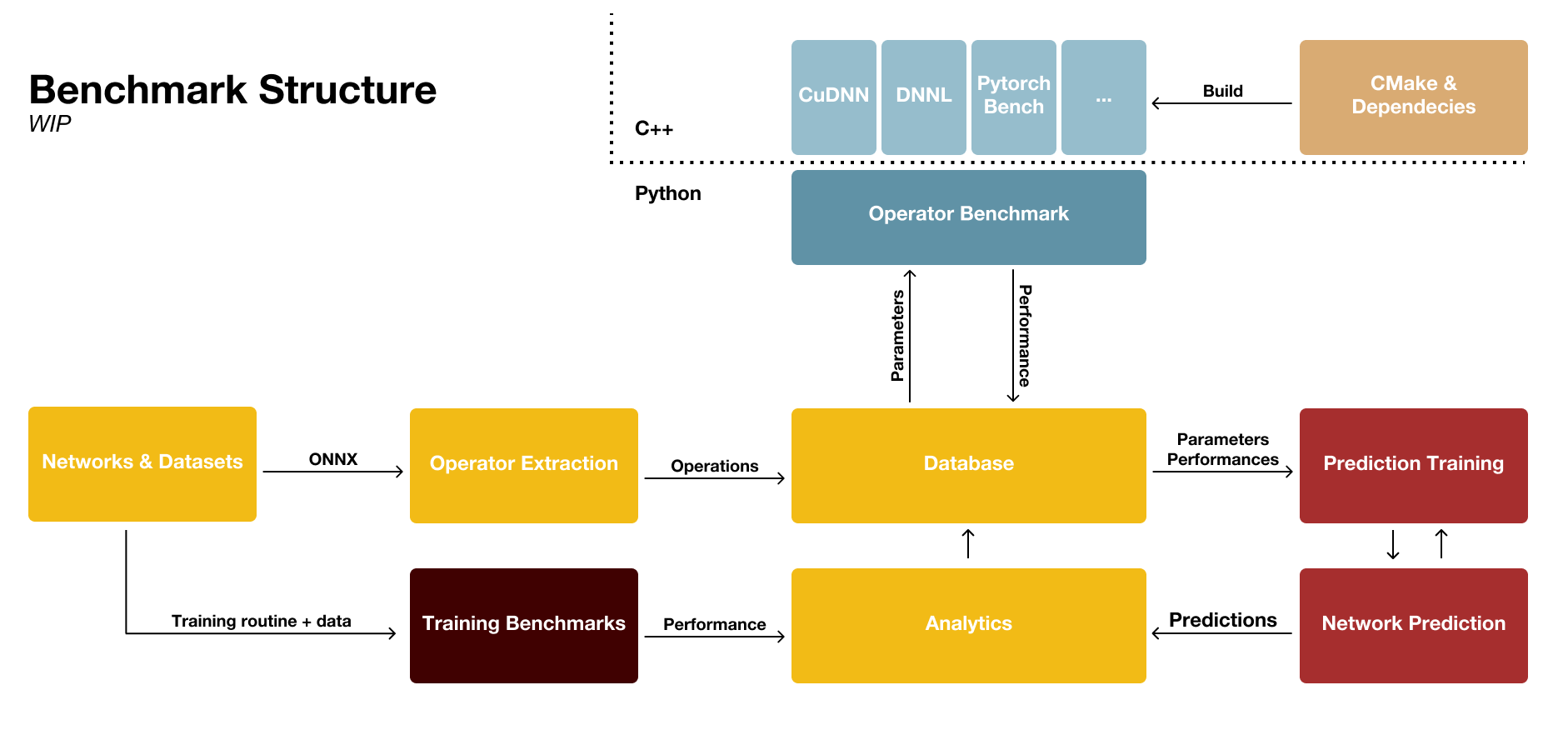This repository contains a collection of tools used to test and implement the methodology presented in "A Systematic Approach for Evaluating Deep Learning Workloads".
They can be used to benchmark and analyze deep neural network (NN) training and inference at the NN operator level.
In the current state the starting point is the benchmark.py script at (Core/benchmark.py). This script can be configured to collect and log the diagnostics of interest. The overall structure is illustrated below.
To add a new benchmark for an operator two steps need to be done.
The benchmarks are executed by the python runtime. Benchmarks are executables that take a path to an input csv file and output the performance of each operation defined in the input file. The input csv file is formatted as following:
0, param1, param2, param3, ...
1, param1, param2, param3, ...
...
The inputfiles are stored in the Runtimefiles directory that is created once
the benchmark is run.
The benchmarks need to write an output file with the name "**input filename**_out.csv". It needs to be formatted as following:
id, unit
0, 234.32
1, 2324.1
...
In the first line the unit for the time measurement is set, otherwise ms is the default unit. To add new executables to the benchmark the executable needs to conform with these requirements. Either a prebuild executable can be added or a new build target with the source files can be added to the system.
A prebuild executable only needs to be referenced by the main benchmark as described in 2.
To add a new benchmark that is build with the cmake build system add the source files in a new subdirectory in OperatorBenchmarks.
Include the directory in the main CMakeLists.txt with add_subdirectory(name).
Create a CMakeLists.txt in the subdirectory and define the target, link the necessary libraries as well as the header files.
Example CMakeLists.txt for the intel/convolution benchmark:
# define target
add_executable(intel_conv std_conv_bench.cpp)
# find MKLDNN
find_package(MklDNN)
# include headers
target_include_directories(intel_conv PRIVATE ${MKLDNN_INCLUDE_DIR})
# link prebuild library
add_library(mkldnn SHARED IMPORTED)
target_link_libraries(intel_conv mkldnn)
set_target_properties(mkldnn PROPERTIES IMPORTED_LOCATION ${MKLDNN_LIBRARY})
Custom CMake find packages for special library dependencies can be added in OperatorBenchmarks/cmake.
Build the executable with the main build system as described here: TODO:add link
Every benchmark is defined in Core/Runtimetools/init.py.
When the runtime is initialised all benchmarks with an executable in the respective location will be available for execution.
A standard entry looks as following:
OperatorBenchmark(name="CPU_Convolution2D",
synonyms=["Conv"],
exe="OperatorBenchmarks/build/intel/convolution/intel_conv",
param_descr=["N", "C", "H", "W", "K", "kernel_shape_0", "kernel_shape_1", "pads_0", "pads_1", "strides_0", "strides_1"]
)
The name field defines a descriptive name for the operator benchmark.
The synonyms indicate which onnx op_types shall be associated with this benchmark.
The name is also part of the synonyms. The synonyms and name govern the mapping from the operators in the database to the operator benchmarks.
The param_descr describe the order and assignment of accepted parameters. If there is an operator with the
parameter_descriptors: ["W", "H", "C", "N"] and a benchmark defined with param_descr: ["N", "C", "H", "W"] the
parameters will automatically reordered. If the assignment of the parameters are ambiguous the assignment is done by order.
It is possible to discard parameters! If the benchmark takes less parameters as supplied by the database, unassigned parameters are discarded.
To add a new Training benchmark two things need to be done:
- Instrument the training code with the respective analytics
- Register the benchmark in the benchmark runtime
The benchmark currently only supports pytorch. Any trainable pytorch network can be added by instrumenting the main training loop. For this the Runtimetool/benchmark_diagnostics contain wrappers. An example instrumentation would be as following:
from Runtimetools.benchmark_diagnostics import op_performance_analysis_cpu
...
for batch_idx, (inputs, targets) in enumerate(trainloader):
with op_performance_analysis_cpu(batch_idx): # <-- Include the diagnostics wrapper
# standard training loop
inputs, targets = inputs.to(device), targets.to(device)
optimizer.zero_grad()
outputs = net(inputs)
loss = criterion(outputs, targets)
loss.backward()
optimizer.step()
# end loop
After training a file with diagnostics for a single batch with the measured time performances of the operations is written to the runtimefiles and loaded by the main benchmark script. Note: This currently only measures a single batch, average of multiple batches is wip. Instrumenting the training introduces latency to the overall training time.
Similar to registering an operator benchmark, the training benchmark needs to be registered in Core/Runtimetools/init.py. A standard entry looks as following:
TrainingBenchmark(name="Resnet50_cifar10",
parameters=" --batch-size 128 --epochs 1",
exe="TrainingBenchmarks/Resnet50_cifar10.py"
)
The name field defines a descriptive name for the training benchmark.
The parameters are optional parameters that control the hyperparameters of the training.
All parameters that are normally passed to the script can be included here.
The idea is that complete training scripts can easily be included into the benchmark without major changes.
